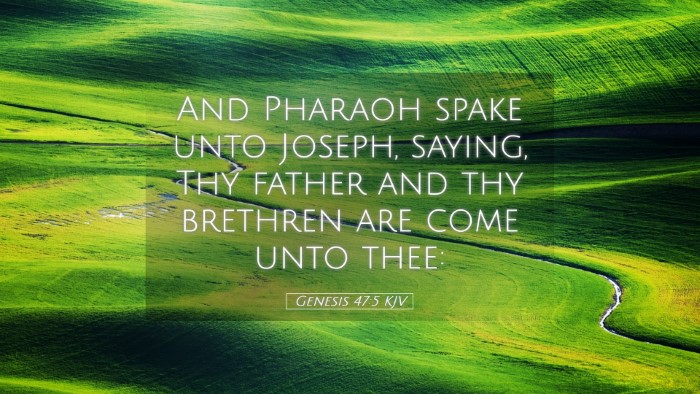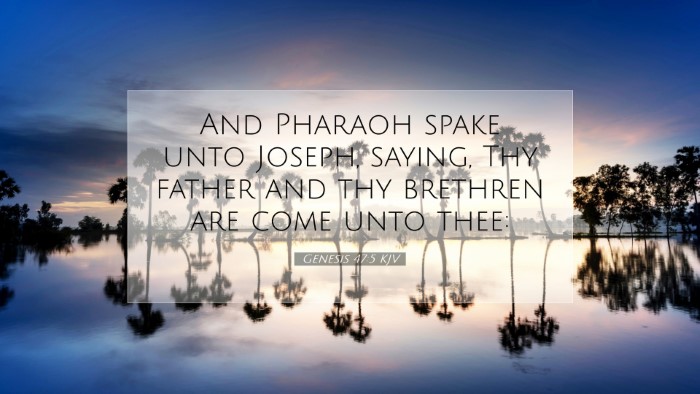Genesis 47:5 - A Commentary
Genesis 47:5 reads: “And Pharaoh spake unto Joseph, saying, Thy father and thy brethren are come unto thee: the land of Egypt is before thee; in the best of the land make thy father and brethren to dwell; in the land of Goshen let them dwell: and if thou knowest any men of activity among them, then make them rulers over my cattle.”
Context and Setting
The context of this verse lies in the narrative of Jacob's family relocating to Egypt during a time of famine. Joseph, having risen to prominence in Egypt, becomes the intermediary between Pharaoh and his own family. The verse encapsulates Pharaoh's recognition of Joseph's family and his generous offer regarding their settlement in Egypt.
Pharaoh’s Generosity
Pharaoh's statement reflects his benevolence and pragmatism. By providing for Joseph's family, he not only helps his trusted servant but also strengthens his allegiance and loyalty. The offer of the land of Goshen, known for its fertility, is a testament to Pharaoh's appreciation for Joseph’s contributions during the famine.
Insights from Commentators
Matthew Henry:
Henry emphasizes the favor shown by Pharaoh as an act of divine providence. He points out that the choice of Goshen is significant, symbolizing a place of sustenance and growth for Joseph's family. Henry notes that the land's suitability for shepherds was vital given that Joseph's family were herders (Genesis 46:34), highlighting the meticulous care of God in providing for His people even in a foreign land.
Albert Barnes:
Barnes elaborates on the implications of Pharaoh's command for Joseph to settle his family in the best of the land. This not only showcases Pharaoh's kindness but also indicates a strategic political maneuver. By bringing Jewish shepherds into Egypt, Pharaoh is effectively establishing a labor source while ensuring that Joseph remains loyal and in a position of influence. Barnes notes that this act illustrates God’s sovereign control over the affairs of men, wherein He places His people in positions of both physical and spiritual prosperity.
Adam Clarke:
Clarke offers a deeper theological reflection on the dynamics of power and provision. He notes that Pharaoh's open invitation to Joseph's family highlights God's plan to protect Israel during their formative years as a nation. Clarke points out the importance of Joseph's identity as a leader not only in Egyptian society but also for his family, recognizing his responsibility to guide and provide for them. The mention of “men of activity” reflects Joseph's continued commitment to excellence and diligence, valuing the gifts and skills of his family even in new circumstances.
Theological Implications
This verse reveals several key theological insights:
- Divine Providence: The relocation of Joseph's family is orchestrated by God, demonstrating His faithfulness to His covenantal promises.
- Respect for Authority: Joseph's relationship with Pharaoh exemplifies how believers can navigate secular authority and find favor through faithfulness and integrity.
- God’s Provision: The choice of Goshen symbolizes God’s provision for His people, ensuring their growth and sustenance even in difficult times.
- Familial Responsibility: Joseph's role emphasizes the importance of family and the responsibility to care for one's relatives, aligning with biblical principles of kinship.
Practical Applications for Today's Context
For pastors, students, and scholars, this commentary provides several practical applications:
- Encouragement in Adversity: Just as Joseph's family found refuge and provision in Egypt, believers can trust in God’s provision, regardless of their current circumstances.
- Leadership in Community: Joseph’s leadership serves as a model for Christian leaders today, highlighting the importance of supporting and uplifting family and community members.
- Understanding God’s Plan: The unfolding of events in Joseph’s life illustrates how God works through human actions and decisions, encouraging faith in God's overarching purpose.
Conclusion
Genesis 47:5 is rich with meaning, illustrating the interplay of divine providence, human responsibility, and the significance of familial relationships. The insights from historical commentators such as Matthew Henry, Albert Barnes, and Adam Clarke offer valuable perspectives that resonate with contemporary believers, affirming the timelessness of Scripture and its application in our lives today. As we reflect on this passage, may we be inspired to trust in God’s plans and to extend generosity and kindness as Pharaoh did, recognizing the profound influence our actions can have on others.


